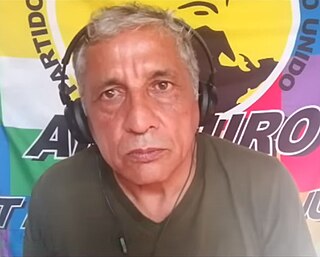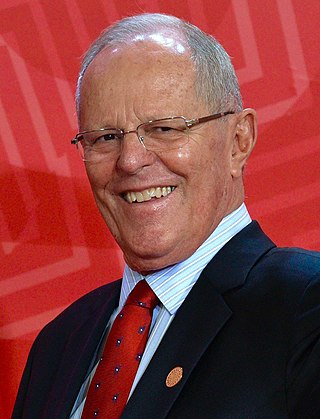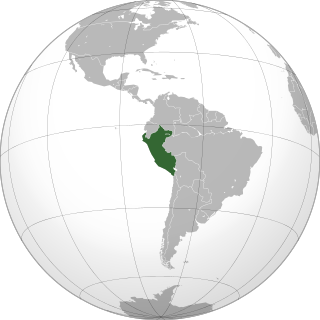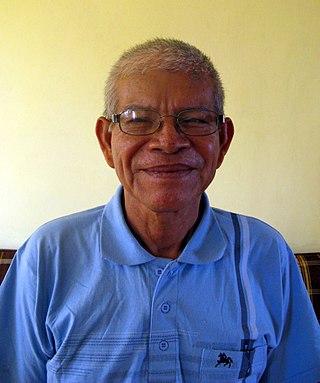Related Research Articles

Antauro Igor Humala Tasso is a Peruvian ethnocacerist, a former army major, and nationalist leader. He has been the Leader of the political party ANTAURO since its creation in 2023.

Pedro Pablo Kuczynski Godard, also known simply as PPK, is a Peruvian economist, public administrator, and former politician who served as the 59th President of Peru from 2016 to 2018. He served as Prime Minister of Peru and as Minister of Economy and Finance during the presidency of Alejandro Toledo. Kuczynski resigned from the presidency on 23 March 2018, following a successful impeachment vote and days before a probable conviction vote. Since 10 April 2019 he has been in pretrial detention, due to an ongoing investigation on corruption, money laundering, and connections to Odebrecht, a public works company accused of paying bribes.

The United States–Peru Trade Promotion Agreement is a bilateral free trade agreement, whose objectives are eliminating obstacles to trade, consolidating access to goods and services and fostering private investment in and between the United States and Peru. Besides commercial issues, it incorporates economic, institutional, intellectual property, labor and environmental policies, among others. The agreement was signed on April 12, 2006; ratified by the Peruvian Congress on June 28, 2006; by the U.S. House of Representatives on November 2, 2007, and by the U.S. Senate on December 4, 2007. The Agreement was implemented on February 1, 2009.

The Matsés or Mayoruna are an indigenous people of the Peruvian and Brazilian Amazon. Their traditional homelands are located between the Javari and Galvez rivers. The Matsés have long guarded their lands from other indigenous tribes and struggle with encroachment from illegal logging practices and poaching.

The Indigenous peoples of Peru or Native Peruvians comprise a large number of ethnic groups who inhabit territory in present-day Peru. Indigenous cultures developed here for thousands of years before the arrival of the Spanish in 1532.

Lesbian, gay, bisexual, and transgender (LGBT) people in Peru face some legal challenges not experienced by other residents. Same-sex sexual activity among consenting adults is legal. However, households headed by same-sex couples are not eligible for the same legal protections available to opposite-sex couples.

Hugo Blanco Galdós was a Peruvian political figure, leader of the Confederación Campesina del Perú, leader of Trotsky's Fourth International and a writer.

The 2009 Peruvian political crisis resulted from the ongoing opposition to oil development in the Peruvian Amazon by local Indigenous peoples; they protested Petroperú and confronted the National Police. At the forefront of the movement to resist the development was Asociación Interétnica de Desarrollo de la Selva (AIDESEP), a coalition of indigenous community organizations in the region.

Amazonian Kichwas are a grouping of indigenous Kichwa peoples in the Ecuadorian Amazon, with minor groups across the borders of Colombia and Peru. Amazonian Kichwas consists of different ethnic peoples, including Napo Kichwa and Canelos Kichwa. There are approximately 419 organized communities of the Amazonian Kichwas. The basic socio-political unit is the ayllu. The ayllus in turn constitute territorial clans, based on common ancestry. Unlike other subgroups, the Napo Kichwa maintain less ethnic duality of acculturated natives or Christians.
Peruvian cumbia is a subgenre of chicha that became popular in the coastal cities of Peru, mainly in Lima in the 1960s through the fusion of local versions of the original Colombian genre, traditional highland huayno, and rock music, particularly surf rock and psychedelic rock. The term chicha is more frequently used for the pre-1990s variations of the subgenre.

Guillermo Arévalo Valera is a Shipibo vegetalista and businessperson from the Maynas Province of Peru. His Shipibo name is Kestenbetsa.

The history of the Jews in Peru dates back to the country's Spanish period with the arrival of migration flows of Sephardic Jews from Europe, the Near East and Northern Africa. This small community virtually disappeared as a result of the Inquisition, and was only revived by two migratory waves that took place during the late 19th-century and the early to mid-20th century, with a number of Sephardic and Ashkenazi Jews arriving to northeastern Iquitos due to the Amazon rubber boom, as well as the country's capital, Lima, through neighbouring Callao, where they also settled due to World War II.
Cannabis in Peru is not legal for recreational use, possession for own consumption is also decriminalized by the Criminal Code and medical cannabis was legalized in 2017.

Since 2016, Peru has been plagued with political instability and a growing crisis, initially between the President, Pedro Pablo Kuczynski and Congress, led de facto by Keiko Fujimori. The crisis emerged in late 2016 and early 2017 as the polarization of Peruvian politics increased, as well as a growing schism between the executive and legislative branches of government. Fujimori and her Fujimorist supporters would use their control of Congress to obstruct the executive branch of successive governments, resulting with a period of political instability in Peru.

Guillermo Antonio Alejandro Aliaga Pajares is a Peruvian politician. He is a Congressman representing Lima for the 2020–2021 complementary term, and belongs to the We Are Peru party. He was Second Vice President of Congress from March 16, 2020, to November 15, 2020, when he resigned in midst of the 2020 protests.

The 2020 Peruvian protests were a series of demonstrations sparked after the removal of President Martín Vizcarra that took place from 9 November to 17 November 2020.

Francisco Rafael Sagasti Hochhausler is a Peruvian engineer, academic, politician, and author who served as the President of Peru from November 2020 to July 2021.

Dengue Dengue Dengue! is a musical duo of electronic music from Peru established in Lima, made up of Rafael Pereira and Felipe Salmon.

Nicaragua and Peru established diplomatic relations in 1857. The two countries have a shared history due to being part of the Spanish Empire. Both countries are members of the United Nations, the Community of Latin American and Caribbean States, the Latin Union, the Association of Academies of the Spanish Language, the Organization of American States, and the Organization of Ibero-American States.

The history of Peru between 1948 and 1956 corresponds to the presidency of General Manuel A. Odría, who overthrew José Luis Bustamante y Rivero through a coup d'état on October 29, 1948. The period's name in Spanish comes from the 8-year length of Odría's presidency. It was a period that for Peru meant the return to militarism, liberal economic policies, repression and persecution of APRA leaders, and manipulative populism over the urban popular classes.
References
- ↑ Brandenburg, Heidi; Orzel, Mathew. "When Two Worlds Collide" (PDF): 7. Retrieved 5 June 2019.
{{cite journal}}: Cite journal requires|journal=(help) - ↑ "Los shawis: Una etnia que se recupera a sí misma | El Comercio Perú". elcomercio.pe. Archived from the original on 2012-09-30.
- ↑ Reuters News Online Archived 2009-06-17 at the Wayback Machine - Peru may use army to end protests at energy sites
- ↑ BBC News Online - Peru throws out Amazon land laws
- ↑ Nicaragua concede asilo a Pizango
- ↑ Indigenous leader arrested on return to Peru. Survival International
- ↑ PERU21, Redacción (2016-09-22). "Baguazo: Sala Penal absolvió a inculpados del delito de homicidio calificado por el caso 'Curva del diablo'". Peru21 (in Spanish). Retrieved 2017-11-05.
{{cite news}}: CS1 maint: numeric names: authors list (link) - ↑ When Two Worlds Collide